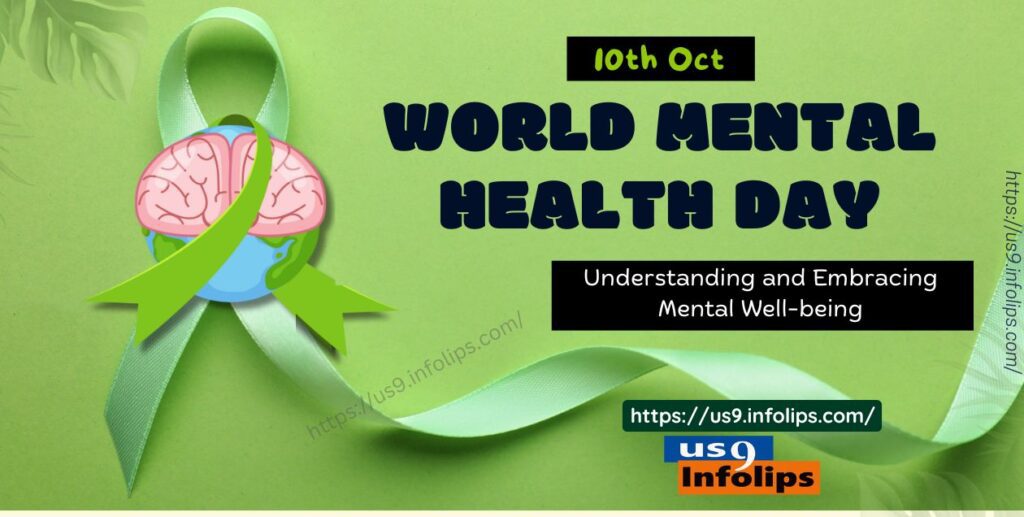World Mental Health Day: Understanding and Embracing Mental Well-being
World Mental Health Day: Understanding and Embracing Mental Well-being
Table of Contents
1. What is World Mental Health Day?
World Mental Health Day is observed every year on October 10th to raise awareness about mental health issues and to promote mental well-being for all. It’s a day dedicated to opening up conversations about mental health, breaking down stigmas, and understanding the importance of mental health care.
2. The History Behind the Day
The World Federation for Mental Health established this day in 1992, aiming to educate and advocate for better mental health care globally. Each year, a unique theme is chosen to address different aspects of mental health, giving people a chance to explore various mental health challenges and find ways to help those affected.
3. Why Mental Health Matters
Mental health is as important as physical health. Our mental well-being affects our thoughts, feelings, and actions. Good mental health allows us to handle stress, build relationships, and live fulfilling lives. Unfortunately, due to stigma, many people suffer silently, which is why it’s crucial to shed light on mental health issues.
4. Common Mental Health Challenges
Mental health challenges can affect anyone, regardless of age, gender, or background. Depression, anxiety, stress, and bipolar disorder are some common conditions. By understanding these challenges, we can better support ourselves and those around us.
5. Signs to Look Out For
It’s essential to recognize signs that may indicate someone is struggling. Persistent sadness, mood swings, irritability, withdrawal from social activities, and changes in sleeping or eating habits can all be signs of mental health issues. Early identification and intervention can make a big difference.
6. How to Take Care of Your Mental Health
Simple daily habits can improve mental well-being. Practices like regular exercise, healthy eating, maintaining a sleep routine, and practicing mindfulness or meditation can help. Taking time to relax and do things we enjoy also plays a big role in our mental health.
7. The Role of Community Support
Having a supportive community can make a tremendous difference. Family, friends, and support groups can provide understanding, encouragement, and companionship. Sharing experiences and being there for each other can help us all cope with mental health challenges.
8. Professional Help is Always an Option
There’s no shame in seeking help from mental health professionals, such as therapists, counselors, or psychologists. They can provide valuable tools and resources for managing mental health issues. Seeking help is a sign of strength, not weakness, and can lead to meaningful progress.
9. Breaking the Stigma
Stigmatizing mental health makes it harder for people to seek help. Educating ourselves and others, being open-minded, and showing empathy can help break down these barriers. A society that accepts and understands mental health challenges is one where everyone can feel supported and valued.
How to Observe World Mental Health Day
There are many ways to observe this day. People can participate in awareness events, join mental health discussions, or simply check in on friends and family. Spreading awareness on social media, sharing personal stories, or participating in local events can also make a positive impact.
9 Objectives of World Mental Health Day
- Raise Awareness: Spread knowledge about mental health issues globally.
- Break the Stigma: Encourage open discussions to reduce stigma and discrimination.
- Promote Mental Health Care: Advocate for better mental health services and support.
- Support Community Building: Foster a sense of community for those affected by mental health challenges.
- Encourage Self-Care: Promote habits that improve mental well-being.
- Improve Access to Services: Push for accessible mental health resources worldwide.
- Educate on Mental Health: Provide resources and tools for understanding mental health.
- Encourage Early Intervention: Highlight the importance of recognizing symptoms early.
- Empower Individuals: Encourage people to take control of their mental health and seek help.
9 Facts About World Mental Health Day
- World Mental Health Day was first celebrated in 1992.
- It was founded by the World Federation for Mental Health.
- Each year, the day has a unique theme focused on a specific mental health issue.
- The day is observed in over 150 countries worldwide.
- Many organizations host events, seminars, and workshops to promote mental health awareness.
- World Mental Health Day is often associated with green ribbons, symbolizing mental health.
- It is recognized by the United Nations, underscoring its global importance.
- The day emphasizes that mental health is a human right.
- Many celebrities and public figures share their stories to inspire others on this day.
9 Interesting Unknown Facts About World Mental Health Day
- Initially, World Mental Health Day had no theme until 1994.
- The first theme focused on improving mental health services worldwide.
- Many countries use this day to launch national mental health policies.
- Some nations offer free mental health screenings on World Mental Health Day.
- The World Health Organization collaborates with WFMH to promote the day.
- Social media campaigns on this day reach millions, spreading awareness further.
- Mental health awareness walks and events are common in cities worldwide on this day.
- Over the years, various themes have focused on topics like suicide prevention, youth mental health, and mental health in the workplace.
- Some workplaces now offer mental health training programs inspired by the awareness raised on this day.
9 Controversies Surrounding World Mental Health Day
- Tokenism: Some critics argue that for many, the day becomes a one-time awareness event without long-term action.
- Funding Gaps: There is criticism that despite awareness, funding for mental health services remains inadequate.
- Stigmatizing Campaigns: Some awareness campaigns have been accused of unintentionally reinforcing stereotypes.
- Over-commercialization: Concerns exist that the day has been overly commercialized by companies without genuine contributions to mental health causes.
- Inadequate Global Participation: Some countries, particularly in low-income regions, do not observe the day effectively.
- Insufficient Focus on Local Issues: Global themes may sometimes overshadow region-specific mental health challenges.
- Misrepresentation by Media: Mental health topics are sometimes sensationalized, which can spread misinformation.
- Political Hijacking: In some cases, political groups have used the day to promote unrelated agendas.
- Lack of Continuity: There’s criticism that the focus on mental health should extend beyond a single day, with more sustained efforts year-round.
Conclusion
World Mental Health Day serves as a powerful reminder of the importance of mental health. It encourages us to talk openly about our challenges, seek help without shame, and support one another in our journeys toward well-being. By celebrating this day, we can take small but impactful steps toward a world where everyone feels heard, understood, and valued.
FAQs about World Mental Health Day
- What is World Mental Health Day?
It is an international day for mental health awareness observed on October 10th. - Who started World Mental Health Day?
The World Federation for Mental Health initiated the day in 1992. - What is the theme for World Mental Health Day 2024?
The theme changes yearly; you can check the official WFMH website for this year’s theme. - Why is mental health awareness important?
Awareness helps break the stigma, educates people, and encourages those affected to seek help. - How can I observe World Mental Health Day?
You can participate in events, share information on social media, or support mental health causes. - What are some common mental health disorders?
Common disorders include anxiety, depression, bipolar disorder, and PTSD. - How can I support a friend with mental health issues?
Listen without judgment, encourage them to seek help, and provide reassurance. - Can mental health affect physical health?
Yes, poor mental health can lead to physical health issues like heart problems and weakened immune systems. - Are there free resources available for mental health support?
Many countries have helplines, online resources, and organizations offering free support.
.
Follow us for more captivating articles and stay connected to explore the world. Let’s embrace the power of communication and understanding.
Disclaimer: The views in this article are given with the help of information available on the net. Readers are encouraged to conduct their own research before making any decisions. The publisher disclaim any liability for any loss or damage caused directly or indirectly.

Related topics:
1. Perfect World Travel Guide
2. 9 Most Popular EV Cars in the USA
3. 9 Best Things About Apple TV 4K – Third Generation
4. Think before You Renew Amazon Prime
5. Jimmy Carter: A Great Legacy
6. Memorial Day: Honoring the Sacrifice, Celebrating Freedom
School Site :
For English grammar and lot more : Smart School Infolips
Marathi Poems: Marathi Rang












